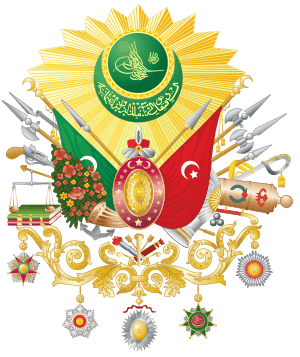Kapıkulu
Kapıkulu (Ottoman Turkish: قپوقولو اوجاغی, Kapıkulu Ocağı, "Slaves of the Sublime Porte") was the collective name for the Household Division of the Ottoman Sultans. They included the Janissary infantry corps as well as the Six Divisions of Cavalry. Unlike provincial levies such as the timariots and irregular forces (levend), the kapıkulu were professional, standing troops, mostly drawn through the devshirme system. They formed the backbone of the military of the Ottoman Empire during its "classical period", from the 15th century until the Auspicious Incident that lead to the abolition of the kapıkulu during the 19th century Tanzimat.
Part of a series on the |
|---|
| Military of the Ottoman Empire |
 |
|
Classical army (1451–1826) Kapıkulu (Janissaries · Six Divisions of Cavalry) · Sipahi · Voynuks Yamaks · Dervendjis · Sekban · Akinji · Azap · Levend · Timariots · Yaya · Humbaracı |
|
Modern army (1861–1922) |
|
|
| Conscription |
Sources
- Uyar, Mesut; Erickson, Edward J. (2009). A Military History of the Ottomans: From Osman to Atatürk. ABC-CLIO. ISBN 978-0-275-98876-0.CS1 maint: ref=harv (link)
gollark: What with?
gollark: <@!565075471012855820> What "programming language"?
gollark: Basically, it stores the value of all superglobals© in the CLOUD™ when they're updated and pulls them down from the CLOUD™ when their values are needed.
gollark: Superglobals.
gollark: <@!111608748027445248> POtatOS supports those.
This article is issued from Wikipedia. The text is licensed under Creative Commons - Attribution - Sharealike. Additional terms may apply for the media files.